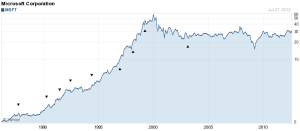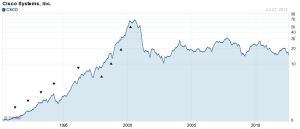Led by its blundering chief executive Steve Ballmer, software giant Microsoft has “lost a decade” in its competition against rivals; Apple, Facebook, and Google have roared by it with more relevant offerings, leaving Microsoft in the dust suffering from a stagnant stock price and old-fashioned products.
That’s the argument made in a long piece in Vanity Fair published last week, and one that’s been widely debated in recent days.
But while so much fuss is being made about what’s in Microsoft’s rear-view mirror, the big test for Microsoft is the cornucopia of opportunity in its future. The company’s fate really depends on Windows 8 and the host of other products rolling out over the next year.
Windows 8 is the company’s new operating system, due in October, though it’s already being tested by developers. It’s Microsoft’s line in the sand. It’s so ambitious that it aims to cater to both touch-screen (tablet) and non-touch screen (PC) interfaces. Either companies and consumers buy it, or they don’t. True, some big players have been very critical of the OS already, calling it a “catastrophe” because of its code complexity. Its Metro touch-oriented UI, kitchen-sinked with everything else will create hassles for developers, according this line.
The critics include, most recently, executives at Valve and Blizzard, two of the biggest companies in PC gaming. Others have praised Microsoft’s ambition, however. Still others have decided to work with it, simply ignoring the pieces they want to. But Microsoft has so much more on the line right now than ever before.
In addition to Windows 8, the company’s getting ready to roll out Office 2013, Windows Phone 8 for smartphones, Xbox 360′s ambitious SmartGlass software, and an updated Windows Azure with IaaS support. Then there’s Microsoft’s Surface tablet, which could spur a whole new product line, but which could also alienate the company’s tablet partners. The list goes on. To call the company sclerotic, as the Vanity Fair piece does, is unfair. The company is on the move, and placing huge bets all over the place.
Contrast this with many other big companies, which look like one-trick ponies by comparison. Microsoft’s value has moved sideways over the past decade (see image at right). But look at RIM or Nokia, which have lost way more than half of their market value over the past three years alone. Or in a fairer comparison, Cisco, another Internet-era bellwether, which has lost a lot more of its value than Microsoft has (see chart below). RIM gets hardware, but fails when it came to thinking about software. Cisco has routers, and fumbled elsewhere. Intel, which also hasn’t done well, has only chips.
Microsoft has stayed relevant all over the place.
Back to the Vanity Fair piece for a minute. The story added little new to the record, one reason we didn’t point to it when it first appeared. And Microsoft spokesman Frank Shaw hit back hard against the piece, blasting Vanity Fair for getting so many things wrong that “I don’t even know where to start.” Among other things, Shaw took issue with Vanity Fair’s criticism of its internal employee grading system (uh, every company with tens of thousands of employees requires some sort of performance system), and its dismissal of products like Xbox (it’s the leading games console in the industry right now).
Of course, both viewpoints are right. It’s true that Microsoft has been surpassed in market value by its younger, more fleet-footed rivals. But it’s also true that Microsoft continues to fight grittily in the trenches and has made valiant investments of time and money to modernize its products or launch new ones, from search technology to interface technology like Kinect. If you’ve got the world’s biggest technology offering and it relies on software downloads, and the Internet comes along, well, of course you’re going to have scramble like crazy merely to stay alive. Sure, Microsoft didn’t get social, but it allied quickly with Facebook. And even Apple has had a hell of a time with social.
Yes, Ballmer has been bombastic, foolishly saying in 2007, after the iPhone first appeared: “No chance that the iPhone is going to get any significant market share,” and in 2005: “Google’s not a real company. It’s a house of cards.” And Vanity Fair’s citation of the late Steve Jobs in pointing out that Microsoft’s problems would continue as long as salesman Ballmer was leading it, is spot on. According to Jobs: “The company starts valuing the great salesmen, because they’re the ones who can move the needle on revenues, not the product engineers and designers. So the salespeople end up running the company.… [Then] the product guys don’t matter so much, and a lot of them just turn off.”
The real surprise is that Microsoft has hung on as long as it has, even as the Web transformed its old business. Micrsosoft looks constantly ready to fight. Each time it looks down for the count, it gets up again and takes another swing. Microsoft hasn’t lost a decade. But the next year, more than any other in recent memory, will test whether Microsoft still has the goods to remain vibrant into the future. That’s because it has Windows 8 and a slew of other critical mobile and UI products coming out — and they all have a chance. The bigger question: Is Ballmer really the one to lead the way?
VentureBeat's mission is to be a digital town square for technical decision-makers to gain knowledge about transformative enterprise technology and transact. Learn More




